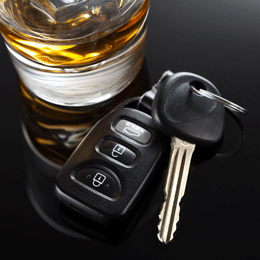One for the Road
 …From the pages of South Jersey Magazine…
…From the pages of South Jersey Magazine… Despite being rejected, proposed DWI law reform continues to be a hot topic of conversation in New Jersey.
Drunk driving is undoubtedly a hot topic everywhere. But in New Jersey, where the state Legislature recently attempted to make dramatic changes to DWI law, it’s bringing key issues to light.
While it sat on his desk for quite some time, at the 11th hour, Gov. Chris Christie rejected a bill that stood to change the way the state of New Jersey punishes drunk drivers. After a lot of back-and-forth between the Houses and much time spent drafting this bill, many are viewing it as a major setback to the efforts to reform the existing DWI laws.
Had it passed, the bill would have repealed the mandatory suspension of driver’s licenses for first-time offenders. Instead, they would be required to install ignition interlock devices, which would not allow them to operate the motor vehicle while intoxicated. As the law currently stands, these devices, which measure the driver’s blood alcohol level, are only required for repeat offenders or those that have a blood alcohol content over 0.15, well over the legal limit.
A roadblock to change
The governor vetoed the bill conditionally, calling it “too lenient” since it allowed courts to reduce the mandatory license suspension time for first-time offenders to just 10 days. The bill, supported by New Jersey Mothers Against Drunk Driving (MADD), provided for the widespread imposition of the Interlock Ignition device while addressing motorists’ concerns that the current law punished first-time offenders too harshly by suspending their motor vehicle driving privileges for a minimum of three months up to a full year. Proponents of the bill argued that the current law often brings harsh consequences for people who are no longer able to sustain their jobs, and to provide for their families financially.
“A lengthy license suspension has the potential to deprive a person of the ability to earn a living and hurts his family,” says Kimberley Stuart, Esq., a partner with Mattleman, Weinroth & Miller, P.C., Attorneys-at-Law, based in Cherry Hill. “New Jersey doesn’t have an occupational or restricted-use license option, as Pennsylvania does, just across the bridge. There is very real potential that a driving while intoxicated conviction for a first-time offender will cause him to lose his livelihood.”
That issue is a key part of what this bill meant to address, continues Stuart. Should there be a hardship waiver? And should the court be able to consider a personal situation in trying these cases?
Although those pushing the anti-drunk driving agenda appreciate a tough stance, it seems that most were in favor of the bill the way it was written. Brandon English, the state program director for New Jersey’s MADD state office, says they had hoped the governor would sign the legislation.
While Gov. Christie’s conditional veto was aimed at the suspension portion of the bill, he did make it clear that he was in support of utilizing interlock devices, even for first-time offenders. English says that MADD is encouraged by Christie’s support in that regard, as it is currently the law in 24 other states.
Get smart
While the bill may be dead in the water after the conditional veto, it likely won’t stop attempts at future reform. In fact, in the history of this DWI law in New Jersey, there have been many attempts to modify it over the years. Besides those that feel it may unnecessarily punish the family of first-time offenders, many also view the law as technical and confusing and claims its effectiveness is being hindered without simple modifications.
While driving under the influence isn’t classified as a “crime” in the state of New Jersey, it’s important to mention that those who are brought to the police station must submit to having their blood alcohol level tested and must cooperate with questioning. If they refuse they will be automatically charged with a refusal, which basically carries the same penalties as a DWI. Perhaps from watching so much Law & Order, many offenders think they are entitled to a lawyer before doing anything.
“Driving while intoxicated isn’t considered a crime in New Jersey, so a driver is not entitled to speak with a lawyer or to have a lawyer present during DWI testing,” explains Stuart. “Possessing a New Jersey driver’s license is not a right, it’s a privilege. A New Jersey driver must cooperate with the police on a DWI stop.”
Of course Stuart says her best advice is to use a car service if you plan to drink at all. Many people have one or two drinks and think they’re fine, but if they’re pulled over for any sort of traffic violation and the officer smells alcohol, or the driver admits to having been drinking, they’re probably going to the station.
“Many of my clients say they only had two drinks and yet their blood alcohol content was high enough to be cited for a DWI,” Stuart says. “Even if you’re going to have just one drink, make plans not to drive. It’s just not worth the risk.”
Published (and copyrighted) in South Jersey Magazine, Volume 12, Issue 1 (April, 2015).
For more info on South Jersey Magazine, click here.
To subscribe to South Jersey Magazine, click here.
To advertise in South Jersey Magazine, click here.
advertisement

Author: Lindsey Getz
Archives
Not Getting the Message
In The News: A Bag Idea
Too Good to be True
More Articles







